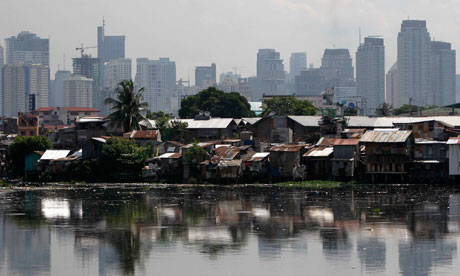lunes, 14 de abril de 2014
Reporte del Panel de Alto Nivel para las Metas post 2015
Va la página del Panel de Alto Nivel Post 2015 y sus reportes:
http://www.post2015hlp.org/the-report/
Uno de los Reportes de Thomas Pogge y Nicole Rippin titulado: "Universal Agenda on the Multiple dimensions of Poverty" aquí.
Memo to the UN: accountability is key to effective development goals
Policymakers must assign specific tasks to specific people if proposed future development targets are not to fall flat

Inequality in action … high-rise buildings tower over slum dwellings in Manila. Many feel the rich wield disproportionate influence. Photograph: Romeo Ranoco/Reuters
At September's UN general assembly, member states will debate what should replace the millennium development goals (MDGs) when they expire in 2015. The official conversation is moving quickly, and the month ahead will offer a significant opportunity for public review before the process moves behind closed doors.
If our new development goals are to be as effective as realistically possible, the debate must push well beyond the report of the UN's high-level panel on the subject. The 12 goals proposed suffer from the same key defects as the MDGs: they are general wishes that do not assign concrete tasks and responsibilities to specific actors, and they do not meet civil society aspirations for systemic reforms of global institutions.
To eradicate poverty, we must understand why it persists on such a huge scale in an affluent world. The poorer half of humanity accounts for less than 3% of global household income because of national and supranational institutional arrangements, the design of which only the rich can influence.
Wealthy people and their associations – corporations, banks, hedge funds – have enormous advantages in scale, expertise and political influence, which enable them to do better than others under the existing rules, and also to influence the formulation and application of these rules to their advantage. Without serious compensation mechanisms (such as inheritance taxes and progressive income taxes), the capture of basic regulation by the richest citizens causes the rules of any national economy to reflect their interests, generating a tendency towards greater inequality.
Globalisation has recently extended this familiar phenomenon to the supranational level, where a network of international rules and regulations is rapidly gaining an influential role in structuring the world economy and is thereby increasingly shaping the evolution of global income and wealth distribution. Rule-making of this kind results in the poor becoming even more marginalised than they are at national level, because there is no democratic counterweight to corporate lobbying and no transparency, even after the fact, in regard to intergovernmental negotiations.
During the past 20 years, for example, strong uniform protections of intellectual property rights have been incorporated into the global trading system through initiatives such as the World Trade Organisation's (WTO) trade related aspects of intellectual property rights (Trips) agreement. Under this punishing regime, most new life-saving drugs have been placed beyond the reach of a large majority of the world's population. By contrast, the agreement does not contain even basic protections of minimally decent working conditions.
The compiling of a new development agenda is an appropriate moment to call for the reform of such unjust arrangements. Supranational institutional rules and practices, unlike development aid projects, are directly under the control of the world's most powerful states. Clear reform goals with strong accountability provisions could really make a difference. While it is hard to establish who is responsible for slow development in a country, it is much easier to know which governments are blocking reforms on tax dodging or access to advanced medicines.
The closest the panel's report gets to considering institutional reforms is a nod to the "special responsibilities" of developed countries "in ensuring that there can be no safe haven for illicit capital and the proceeds of corruption, and that multinational companies pay taxes fairly in the countries in which they operate".
But what exactly are these responsibilities? Is it enough for each rich country to supervise the activities of banks in its own jurisdiction? Or must these rich countries together force the world's tax havens and secrecy jurisdictions to co-operate? Without a clear specification of tasks, each actor will favour the most minimal interpretation of its own responsibilities – as has been very much in evidence with the MDGs.
If stated commitments to solidarity and shared responsibility are to amount to more than lip service, future work on hammering out new development goals should specify plausible institutional reforms that could be implemented by the more affluent countries, and which would reduce the headwinds existing institutional arrangements are blowing against the poor.
If broader institutional reform is not on the cards for now, and the next set of global development goals must take the form chosen by the panel, then all targets should be clearly defined; measurement methods should be specified, and independent experts appointed for the monitoring of tasks.
Above all, it must be clear who is supposed to do what. The most powerful and influential agents must be given clear tasks and responsibilities – not merely in the arena of development assistance, but also in terms of tasks that must be taken into account in all their policy and institutional design decisions, at both the domestic and – especially – the supranational level. A good start would be to commission experts to provide written assessments of the impact specific decisions can be expected to have on the world's poor.
• Thomas Pogge is Leitner professor of philosophy and international affairs at Yale University, and international president of Academics Stand Against Poverty (Asap). Mitu Sengupta is associate professor of politics at Ryerson University, and director of Asap Canada
AQUI lo puede conseguir en español. En la Revista Dilemata ¿Podemos tener objetivos de verdad, por favor? Por qué las alternativas propuestas para reemplazar a los Objetivos de Desarrollo del Milenio no tendría éxito, año 5, No 13, 2013, pp. 167 - 169,
Suscribirse a:
Entradas (Atom)